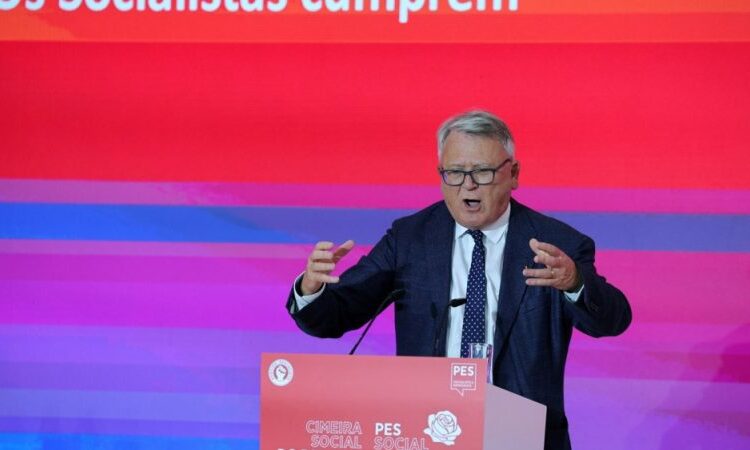Socialists seek EU Commission portfolios on green transition, economy, social affairs after elections – Euractiv

European socialists are seeking to lead European Commission portfolios on the green transition, economy, and social affairs for the next mandate, the socialist EU leading candidate Nicola Schmit told Euractiv in an exclusive interview.
Schmit is the European Commissioner for Jobs and social rights and will be elected as leading candidate of the centre-left Party of European Socialists on Saturday (2 March), the second largest European political party after the centre-right European People’s Party (EPP).
As EU leading candidate, or the spitzenkandidat, Schmit is running to be the next president of the European Commission, running against the incumbent German Christian Democrat President Ursula von der Leyen.
“In the next Commission, besides the presidency, it will be important for us the social economic and green transition dimension, which are deeply interlinked,” he said ahead of the congress of the Party of the European Socialists, dedicated to EU elections.
On whether the socialists will ask to have commissioners for these subjects, Schmit said that “considering the priorities outlined, it is clear that the organisation of the Commission should be adjusted to align with our political priorities.”
In this commission, the socialists already have two of the three portfolios, led by the Italian Paolo Gentiloni for economic matters, and Schmit for jobs. Ex-climate commissioner Frans Timmersmans who had the third, was recently replaced Dutch Christian democrat (CDA) Wopke Hoekstra.
Electoral narrative, main social policies
The commissioner mentioned policies such as minimum wage, and the platform workers directive would be vital to him in this mandate.
“We have to get decent wages. We have to restore a stronger collective in Europe,” the EU’s leading candidate said.
“Second one obviously is the social field of platform workers directive [PWD]. I still have some hopes that, in the end, we will manage to approve it,” Schmit said.
The PWD or Platform Workers Directive is an EU law to improve working conditions for people in the gig economy.
EU institutions reached a deal in early February, and now the co-legislators (European Parliament and Council of the EU) have to formally seal the deal before the next elections in June, with some governments, such as France and Germany, not available to confirm the agreement.
“We have to make sure that Europeans feel secure,” Schmit told Euractiv.
“When I say secure, I mean both external security – we are living in dangerous times – but also internal one, which also means economic and social security,” Schmit said.
This assertion is similar to what von der Leyen said last week in her speech after announcing her second bid as European Commission president.
“Citizens want more defence in Europe. They want us to invest and remain transatlantic but to become more European. I also want to look at security in a wider sense: citizens want to be safe on our streets. They want protection from poverty and illness, and they want to know who takes care of them when they are old,” von der Leyen told the press, pointing out the need to fight corruption and defend the rule of law.
Schmit similarly referred to the protection of democracy.
“We will make no compromise with those who are questioning, threatening and limiting the fundamental democratic rights, the rule of law there is no way to have any compromise with the extreme right,” Schmit said.
Von der Leyen said that there are clear red lines when collaborating with some right wing parties, however, she opened the possibility of some parties of the European Conservatives and Reformists (ECR) joining the centre-right European People’s Party (EPP).
“We do not know who is forming [the European Conservatives and Reformists (ECR)] after the elections, what groups will leave ECR and, for example, join EPP, which is also possible,” von der Leyen said last week.
Socialist’s divergence from Von der Leyen on Israel and Palestine
Schmit said he shares von der Leyen’s condemnation of the Hamas attack on the 7th of October, however, differently from her, he heavily criticises Israel “disproportionate reaction” towards Gaza.
“The massive destruction of infrastructures and houses, the starvation of the population, the absence of medical care, the killing of civilians, including children, is just disproportionate,” the EU leading candidate told Euractiv, who described the situation as a major “humanitarian tragedy that cannot be accepted”.
“I am very critical because though I recognise the right of Israel to defend itself, the way how they are doing it goes beyond international and humanitarian law,” added Schmit, who said that he is in favour of a ceasefire.
The ‘worrisome’ Hungarian presidency
In July, Hungary is set to take over the presidency of the Council of the EU, the co-legislator institution where EU ministers gather per matter and adopt the legislation.
The presidency rotates every six months among member states, and currently, it is held by Belgium.
“They have the presidency, we have to see how far we can cooperate with them,” Schmit told Euractiv, saying that he went to Hungary last week to discuss certain issues.
“In more general terms, I am still quite worried about what is going on in this country. On one hand, they give some indication that they are ready to abide by what [the EU asks] them in terms of independence of traditional powers. At the same time, they adopt a law which is absolutely unacceptable, the ‘Sovereignty Law’, against which [the Commission has] already launched an infringement procedure.
The legislation prohibits political candidates from receiving foreign funds and establishes a government-controlled office with the authority to investigate such funding. Violators of the law could face up to three years in prison.
Last May, the European Parliament asked for the suspension of the presidency during a vote in the plenary.
To the question whether he would agree with such a measure the socialist leading candidate said that “we have a rules based system. The only way we can suspend or take other measures than those we have already taken, is article seven. This is not easy enough to activate.”
Article 7 of the treaties allows the suspension of EU rights if a member states breaches EU fundamental values. In the past mandate, the EU Parliament activated such an article, however, it met an impasse in the Council.
“We have to continue putting pressure on Hungary and explain to them that the evolution of the regime in Hungary is just not compatible with the basic values and rules of the EU,” Schmit concluded.
[Edited by Alice Taylor]







